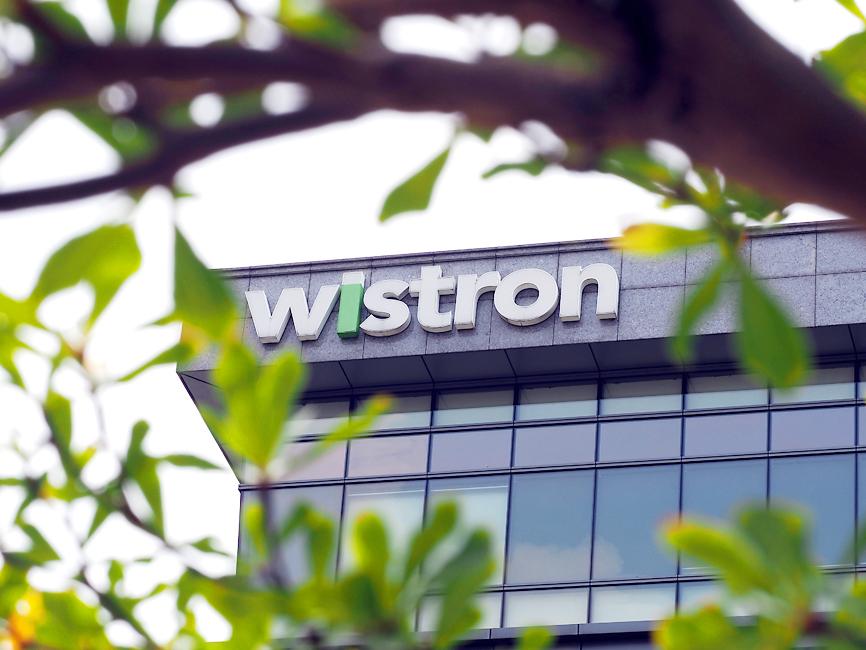Wistron Corp’s (緯創) board of directors has agreed to expand the company’s server production capacity at home and abroad, as well as sell its mobile phone business in China’s Kunshan in January, the company said last week.
The contract electronics maker — whose products include handsets, servers, laptops, PCs, tablets, video game consoles and LCD modules — has been expanding its non-Chinese production capacity over the past year, including in Taiwan, India, Malaysia, Vietnam and even in Texas, amid US-China trade tensions and geopolitical uncertainties.
The company’s board on Thursday approved a proposal to invest US$28 million in Wistron InfoComm Technology (Texas) Corp to add server production capacity at its Mexican plant to support exports to the US, according to company regulatory filings.

Photo: David Chang, EPA-EFE
The board also agreed to lease a plant owned by solar module supplier United Renewable Energy Co (聯合再生能源) in Hsinchu County’s Hukou Township (湖口) for NT$13.02 million (US$451,347) per month as Wistron aims to expand its server assembly capacity in Taiwan, regulatory filings showed.
As for its handset business, the company has reached a deal with China’s Luxshare Group (立訊集團) to sell its Kunshan plant for 3.3 billion yuan (US$499.52 million) and the board on Thursday agreed to close the deal on Jan. 1, while increasing investment in India, the filings showed.
“Wistron will invest more resources in profitable businesses after the disposal of its handset segment,” Yuanta Securities Investment Consulting Co (元大投顧) analysts led by Harvey Kao (高啟瑋) said in a note on Friday. “As the company will lean more on its server business going forward, we expect the contribution from server sales to rise from 27 percent this year to more than 35 percent next year.”
Its server business would become a key sales driver for Wistron next year, as the company’s notebook computer and LCD module businesses are likely to see flat sales compared with this year, while the PC segment would likely see mild market share gains, driven by more order wins from US clients, Yuanta said.
Wistron on Thursday reported third-quarter net profit of NT$2.78 billion, up 61.67 percent from a year earlier, while earnings per share rose from NT$0.61 to NT$1.
Gross margin increased to 5.37 percent, from 5 percent, thanks to a favorable product mix and contribution from its cloud computing equipment subsidiary Wiwynn Corp (緯穎科技).
Foreign-exchange gains of NT$240 million from effective hedging also lent support to margin performance.
In the first three quarters, net profit totaled NT$6.36 billion, or earnings per share of NT$2.26, and gross margin came in at 5.38 percent, the company said.

TAKING STOCK: A Taiwanese cookware firm in Vietnam urged customers to assess inventory or place orders early so shipments can reach the US while tariffs are paused Taiwanese businesses in Vietnam are exploring alternatives after the White House imposed a 46 percent import duty on Vietnamese goods, following US President Donald Trump’s announcement of “reciprocal” tariffs on the US’ trading partners. Lo Shih-liang (羅世良), chairman of Brico Industry Co (裕茂工業), a Taiwanese company that manufactures cast iron cookware and stove components in Vietnam, said that more than 40 percent of his business was tied to the US market, describing the constant US policy shifts as an emotional roller coaster. “I work during the day and stay up all night watching the news. I’ve been following US news until 3am

UNCERTAINTY: Innolux activated a stringent supply chain management mechanism, as it did during the COVID-19 pandemic, to ensure optimal inventory levels for customers Flat-panel display makers AUO Corp (友達) and Innolux Corp (群創) yesterday said that about 12 to 20 percent of their display business is at risk of potential US tariffs and that they would relocate production or shipment destinations to mitigate the levies’ effects. US tariffs would have a direct impact of US$200 million on AUO’s revenue, company chairman Paul Peng (彭雙浪) told reporters on the sidelines of the Touch Taiwan trade show in Taipei yesterday. That would make up about 12 percent of the company’s overall revenue. To cope with the tariff uncertainty, AUO plans to allocate its production to manufacturing facilities in

Six years ago, LVMH’s billionaire CEO Bernard Arnault and US President Donald Trump cut the blue ribbon on a factory in rural Texas that would make designer handbags for Louis Vuitton, one of the world’s best-known luxury brands. However, since the high-profile opening, the factory has faced a host of problems limiting production, 11 former Louis Vuitton employees said. The site has consistently ranked among the worst-performing for Louis Vuitton globally, “significantly” underperforming other facilities, said three former Louis Vuitton workers and a senior industry source, who cited internal rankings shared with staff. The plant’s problems — which have not

COLLABORATION: Given Taiwan’s key position in global supply chains, the US firm is discussing strategies with local partners and clients to deal with global uncertainties Advanced Micro Devices Inc (AMD) yesterday said it is meeting with local ecosystem partners, including Taiwan Semiconductor Manufacturing Co (TSMC, 台積電), to discuss strategies, including long-term manufacturing, to navigate uncertainties such as US tariffs, as Taiwan occupies an important position in global supply chains. AMD chief executive officer Lisa Su (蘇姿丰) told reporters that Taiwan is an important part of the chip designer’s ecosystem and she is discussing with partners and customers in Taiwan to forge strong collaborations on different areas during this critical period. AMD has just become the first artificial-intelligence (AI) server chip customer of TSMC to utilize its advanced